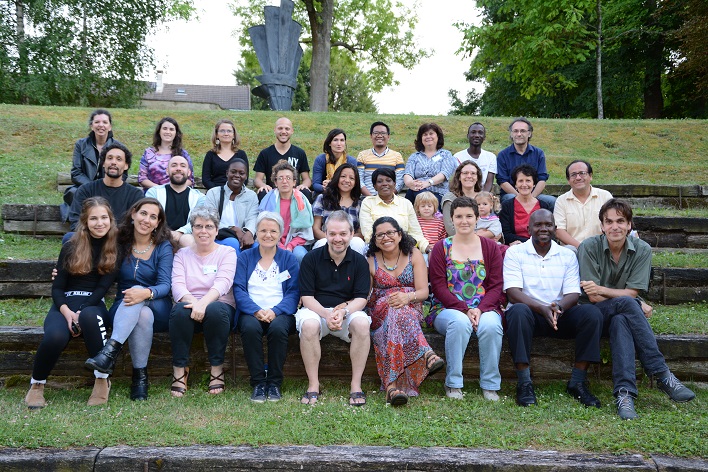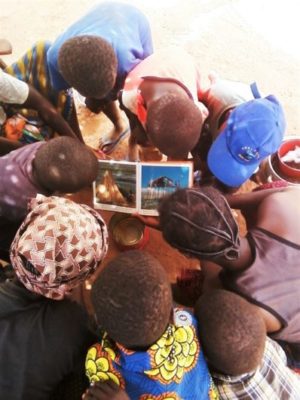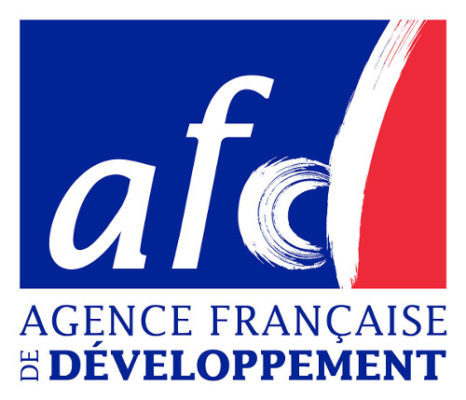Looking at Projects from the Perspective of Success

All children, young people, and adults who live in poverty and exclusion are able to learn. ATD Fourth World teams see this every day and incorporate into their activities certain practices that succeed in helping people to learn. To discuss and share these practices, a five-day work/training session in three languages (English, French, and Spanish) took place from July 10 to 14, 2017, at ATD’s international centre in France.
The meeting evolved from ATD Fourth World’s Common Ambitions of 2013–2017, a long-term organizational focus on prioritizing access to learning using an approach developed with project participants’ own knowledge and perspectives. The meeting brought together some thirty people involved with various ATD educational projects: early childhood and pre-school activities in Haiti and France, street libraries and festivals of learning on all continents, a mobile mini-library in Burkina Faso, mediation between schools and families living in extreme poverty in Spain and Brazil, and literacy programs for young people and adults in Tanzania and the Philippines.
There are many ways to look at our projects, and during the work/training week the focus was on success stories. The participants were guided by Dr. Orna Shemer, an expert in the method “Learning from Success” developed by Professor Jona Rosenfeld, a long-time friend of Joseph Wresinski and ATD Fourth World. This method can be used by anyone. Practitioners look at their activities starting from what works well, then find and analyze key moments or turning points in order to derive principles of action. This process helps them to continuously improve their work and to discuss it with competence and relevance. It also enables them to identify problems and unresolved issues.
One participant summed up her experience:
“During this week, we were generous, we shared our experiences, we asked questions, we dug deep, we looked through the prism of our successes, and we shared our knowledge to bring to light the principles of action that guide our daily lives. Putting our Common Ambitions side by side with these principles has shown us to what extent they are at the core of what we do.”
Throughout this work, rich in the experiences described by the participants, dozens of principles of action were identified, and then grouped into main themes. Here are some significant elements:
- A range of educational projects — in Mirantão in Brazil, Seville in Spain, Noisy-le-Grand in France, and Port-au-Prince in Haiti — highlighted the importance of fully involving as partners the parents of children who are struggling with school, to strengthen ties, build bridges, and foster trust between marginalized communities and professionals in education.
- Literacy projects with children and adults within their own communities — whether in a cemetery where people live in Manila or a fish market in Dar es Salaam — have shown that the development of creative, solid partnerships is key to their success. Examples included finding enough volunteer teachers to conduct individual lessons with children at the Manila street library, and coordinating with the administration of the Dar es Salaam fish market to obtain a room in the market for classes for adults.
- Reports from Bangui in the Central African Republic and Ouagadougou in Burkina Faso emphasized the importance of highlighting the potential, knowledge, and skills of children, young people, and adults in the communities. The young trainees in socio-cultural mediation in Bangui, in the midst of tense armed groups, took the street library into the heart of the Kokoro-Boeing camp for displaced persons. A member of ATD’s Volunteer Corps who visited a neighbourhood on the outskirts of Ouagadougou every week left just one book each time he went. This enabled mothers involved in the project to use their limited reading skills and their imagination to tell stories to their children throughout the week until his next visit.
Other examples from Peru, Mexico, Burkina Faso, and France allowed participants to learn to analyze the details that led to educational successes and to help elaborate collective principles of action, thus confirming the idea that, beyond our diversity of experiences and cultures, we share similar practices that are supported by fundamental values.
This summer workshop provided methodological training and a first step in the process of capitalizing on team experience in the field of education. All the participants plan to disseminate the findings in their respective ATD teams. In the coming months, the question they will keep in mind is, “What are the conditions necessary for children and young people in extreme poverty to succeed in learning?” A seminar will be held in June 2018, when this work will be extended to other partners and stakeholders of the projects discussed at the workshop, as well as to other people involved in education.
More information on ATD’s work in individual countries.
More information about ATD’s Education for All work.
Supported by Agence Française de Développement.



